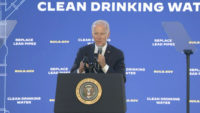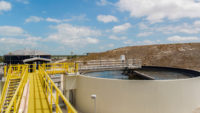The U.S. Environmental Protection Agency is helping finance water infrastructure projects in Maryland, California and Wisconsin with $688 million in low-interest loans, Administrator Michael Regan announced Jan. 19 at the U.S. Conference of Mayors winter meeting
Projects backed by the Water Infrastructure Finance and Innovation Act (WIFIA) loans will support more than 4,000 construction and operation jobs, he told attendees. and are the latest to be highlighted by the Biden administration as EPA and other federal agencies begin to roll out funds allocated through the recently enacted Infrastructure Investment and Jobs Act.
Projects in Baltimore will receive about $396 million in WIFIA loans. The city plans to put a $160.8-million loan toward $389 million in wastewater treatment facility improvements to expand capacity and reliability. Another $192.7-million loan will support a $410.6-million project to replace aging water mains, and the remaining $42.5 million will go toward a series of eight projects to increase the Baltimore City Dept. of Public Works’ stormwater treatment capacity, helping to address flooding and improve water quality.
Using WIFIA loans on the projects will save Baltimore about $100 million, according to EPA.
In Union City, Calif., a $250-million WIFIA loan will help finance $385 million in projects for the Union Sanitary District, including work to modernize its aging wastewater treatment plant and improve its system’s resilience to extreme weather and climate change. The projects will also improve the quality of the San Francisco Bay by reducing nitrogen and ammonia discharged.
The Milwaukee Metropolitan Sewerage District is receiving a $41.6-million WIFIA loan for its waterway flood management and restoration projects that specifically target historically disadvantaged communities. They include design and construction of a 31-million-gallon stormwater management facility, as well as construction of a flood storage basin, culverts and channels. Officials say this is the first of three WIFIA loans Milwaukee is pursuing.
Last year, EPA closed on 29 WIFIA loans totaling more than $5 billion. The agency says it will support more water infrastructure projects this year. It is receiving about $50 billion from the infrastructure law, and officials say EPA will provide $7.4 billion this year to State Revolving Funds for water infrastructure, and more over the next five years.
In a letter to governors in December, Regan encouraged state officials to seek EPA funding to assist disadvantaged communities, replace lead service lines and address contaminants such as perfluoroalkyl and polyfluoroalkyl substances.
“Nearly half of this funding is available as grants or fully forgivable loans—removing barriers to investing in essential water infrastructure in underserved communities, across rural America, and in suburban and urban centers,” Regan said.





